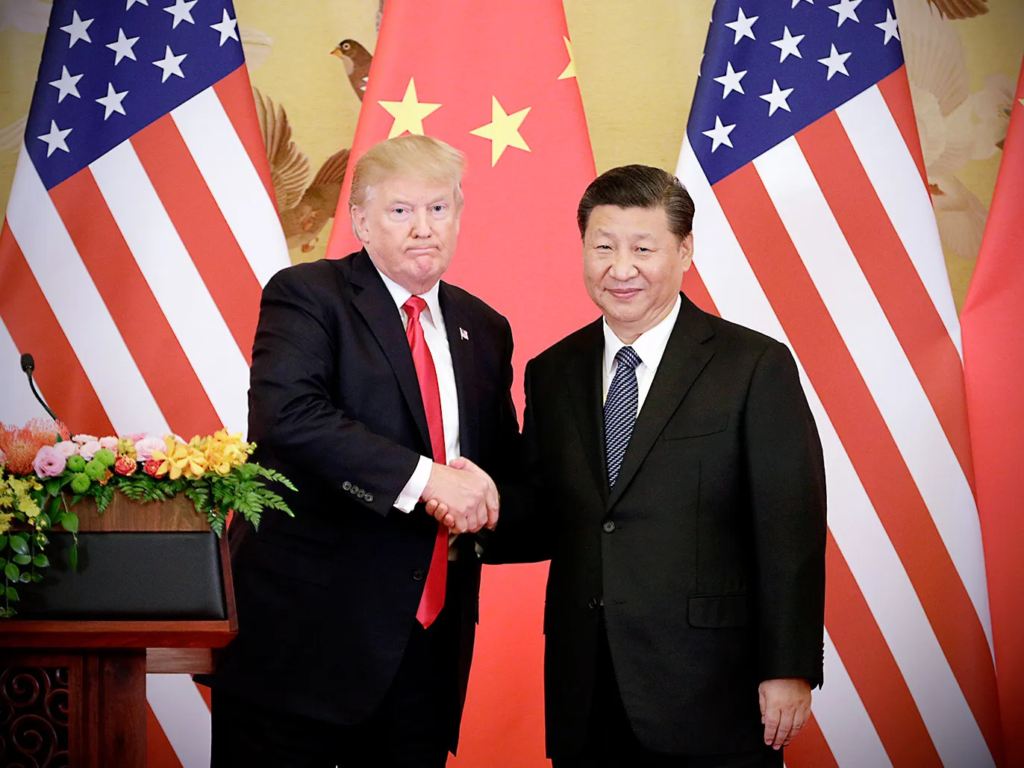United States: Are we witnessing the decline of America?
October 14, 2024 | by Lysandre Chaabi

At the end of the Cold War, the United States was without a doubt the world's leading power. It was at the beginning of the twentieth century that America saw its hegemony falter. Loved as much as it is hated, can America really lose its throne on the world chessboard?
How can we explain the country's weakening?
The weakening of the country began on a key date: September 11, 2001. The United States was the target of the deadliest attacks ever perpetrated. The World Trade Center, a symbol of American power, saw the twin towers collapse after the collision of two planes, while the Pentagon, a symbol of the country's military power, was also hit by a kamikaze plane. Another plane targeting the White House had crashed in Pennsylvania following a rebellion by its passengers. This attack, perpetrated by Al-Qaeda and its leader Osama Bin Laden, caused the death in just two hours of nearly 2,977 people and injured 6,291. This deadly attack gradually led the United States on a downward slope that weakened its image and status. This attack underlines another point: the United States and its civilians can be affected.

It was following these attacks that the United States waged the Second Gulf War in order to reach Osama Bin Laden and avenge his deaths. This is where the United States made, for many, its first bad decision: the invasion of Iraq. The United States, galvanized by hatred, justified this invasion by the supposed possession of nuclear weapons by Saddam Hussein's regime. Despite the lack of evidence and the distrust of many countries towards this attack, notably France, the United States launched the offensive. This attack would have tragic consequences. Iraq has still not recovered from this invasion, despite the withdrawal of American troops in 2011. This attack will have created an unstable political regime in the Middle East and will have especially allowed terrorist groups such as Daesh for example, to expand. Iraqi prisons, where a large number of terrorists were imprisoned, were emptied following the American invasion, allowing these prisoners to join these groups. A large number of countries were victims of these terrorist groups, such as France with the attacks of January and November 2015, causing the death of more than a hundred people.
This intervention in Iraq, despite warnings from its allies, has weakened the image of the United States, which is now considered too impulsive. American interventionism, often seeing itself as the world's police, has also contributed to the wave of American skepticism that the United States is experiencing today.
American politics also seems to have lost its luster in recent years. America and its government can be defined as bipolar in their actions. At the COP 21 in Paris in 2015, the Obama administration joined the agreement, ensuring that the United States would make a lasting commitment to combating global warming. The Trump administration withdrew from these agreements in 2019, before the Biden administration returned to them. This bipolarity makes the United States an unreliable country, even for its allies. The United States was also mocked around the world a few months ago when the future presidency of the United States was going to be played out between two seniors, Joe Biden (81 years old) and Donald Trump (78 years old), before Kamala Harris came to replace the former.

The United States has also repeatedly alienated some of its allies in recent years. This was particularly the case in 2021 during the nuclear submarine crisis. In 2016, the Australian government signed a €34.3 billion contract with Naval Group (later revalued to €56 billion), with the final French share amounting to a maximum of €8 billion, for the construction of twelve Attack-class anaerobic conventional propulsion submarines. Australia decided to turn to Great Britain and the United States to form an alliance that would allow Australia to terminate its contract with France. The contract was thus terminated and the United States provided Australia with eight nuclear attack submarines. This incident created a major diplomatic crisis between France and the United States. France, following this crisis, recalled the French ambassador to the United States, which was a first in its history, as well as the French ambassador to Australia. During an exchange in Rome, Joe Biden apologized to Emmanuel Macron, saying: "What we did was clumsy."
Various factors have weakened the image and power of the United States. While some events, such as the September 11 attacks, were obviously beyond their control, it was above all their impulsiveness and political "bipolarity" that contributed to this weakening.
Competitors again?
The United States, alone in the world after the Cold War, has seen new competitors emerge in recent years for its throne. The United States was considered the world's police, the only country that could dissuade any power from going to war. It is clear that America's competitors are no longer subject to pressure from the United States. This is particularly the case for Russia, which does not hesitate, through its president Vladimir Putin, to challenge American hegemony again. Russia is once again acting according to its desires. The war in Ukraine is proof of this. The United States had promised a strong response to the Kremlin's actions in 2022. Today, Russia has only suffered economic sanctions and the supply of weapons from NATO members for Ukraine. Far too little to scare Vladimir Putin. The United States cannot play the role of mediator in this conflict today and cannot afford to send troops to Ukraine. The nuclear risk and the Kremlin's threats about its use make the hypothesis of an armed intervention unimaginable.

The US non-intervention in Ukraine would also have strengthened the position of another competitor: China. Faced with the United States' limited room for maneuver in Ukraine, China now has its eyes set on Taiwan. Xi Jinping, the Chinese president, promised in 2017 during his second term that China aimed to become the world's leading power by 2049, the centenary of the regime. In order to surpass the United States, the Chinese regime wants to make its army the best in the world. The Chinese also want to have control over the market. In 2013, they launched the Belt and Road Initiative, a project embodying a new Silk Road. To achieve this, China bought ports in different countries in order to facilitate the transit of its goods. In particular, China privatized the port of Piraeus in Athens, Greece, via the Cosco company. The aim of the project is also to improve the country's diplomatic relations with countries close to this route.
China also aims to surpass the United States in science. This is particularly the case in space, where China aims to become the leading space power in 2049.
China has also benefited from the Trump administration's policy. During his term, Donald Trump had always emphasized that his only priority was America. A doctrine that had thus pushed the country to return to its policy of isolationism. China had thus taken advantage of this to extend its influence in the world and particularly in Asia. The Philippines had, for example, promised China to buy military equipment after the election of Donald Trump. The influence of the United States in Asia made it possible to control Chinese influence on the continent. Donald Trump's policy saw Asian countries suffer from China's influence, annoying a large number of countries including India.

The United States now finds itself facing increasingly influential rivals, including China and Russia. These two powers no longer hide their ambitions to take a dominant place on the world stage. China, with its spectacular economic growth and its desire to impose itself militarily, and Russia, in the process of regaining its geopolitical status, represent major challenges to American hegemony.
But what is it really?
Despite a weakened image and the rise of its competitors, the United States should not be worried in the short term by a potential loss of its status in the world.
China, its main competitor, is currently going through a major economic crisis. The regime was greatly affected by the coronavirus crisis in 2020. China has seen, through its numerous lockdowns, many of its economic sectors paralyzed. Beijing's plan to revive the Chinese economy is now a failure. China's recovery has weakened, with disappointing GDP growth, a fall in consumer confidence and a collapse in real estate prices, which has caused the bankruptcy of some of the country's largest companies. This is notably the case of Evergrande. The company was the world's largest real estate developer before accumulating more than $300 billion in debt due to excessive borrowing and overexpansion. The company defaulted on its debt in 2021 and has since been in liquidation, with losses exceeding $81 billion for 2021 and 2022.
China also has a bad image internationally. China is one of the bad students when it comes to global warming in particular. China is the world's biggest polluter (30 % of CO2 emissions) ahead of the United States (14 %). China is also one of the countries that benefits the most from the poaching of animal species. China is the country where pangolin trafficking is the highest in the world: around 3 million pangolins per year. But the most killed animal in China is the rhinoceros. China also consumed, thanks to poaching, between 1990 and 2023, 105,931 elephant ivories.
The country is also adept at censorship. The Beijing regime cannot be criticized even today. Censorship in the country is strong and few voices dare to be heard. Xi Jinping's regime does not, for example, limit the time that young Chinese spend in front of their screens and video games. It also seeks to regulate the content they watch and the games they play. In 2018, the regime also arrested Xu Zhangrun, a 57-year-old intellectual and major figure in the protest against Xi Jinping's power. His direct criticism of the communist regime made him a prime target for Beijing. Chinese youth are reluctant to stay in China. As proof, nearly a million students have chosen to continue their university studies outside China. 289,000 have gone to the United States.
Russia, for its part, today has an unstable economy linked to the war in Ukraine and a technological lag far too great compared to its greatest rival of the last century. However, Russia remains the country with the largest number of nuclear warheads (5,889) ahead of the United States (5,244). The two countries together possess 90 % of the world's nuclear weapons.
The United States, however, remains the country with the largest army. It has 1,400,000 soldiers and is present on all continents and oceans. The United States, with 11 aircraft carriers in total, has 40 % of the world fleet. The country also invests hundreds of billions of dollars in its army every year (916 in 2023). American hard power is also reinforced by its role as leader of NATO and permanent member of the UN. The UN headquarters is also in New York.
The United States is also the world's leading economic power today. With Wall Street, the country benefits from the world's leading stock exchange. The economic power of the United States is not limited to New York. For example, California alone has a GDP that would place it fifth among world economies. Overall, the United States has the largest GDP in the world, reaching $20.5 trillion, ahead of China ($16.6 trillion).

One of the greatest strengths of the United States today is its soft power. For many, America is a land of success and excellence. 9 of the 10 largest fortunes in the world are American, including Elon Musk, Jeff Bezos and Bill Gates. This image of excellence is also reflected in the fact that the United States has some of the best universities in the world on the East Coast, with Harvard and Yale, for example, but also in the West with Berkeley and Princeton. Unlike China, the country welcomes more than a million international students each year. The country also has a large number of innovative centers, such as Silicon Valley, which is home to the headquarters of Google and Facebook. The country has also seen the birth of a large number of companies that are now known worldwide, such as Apple, Microsoft and Ford. The products of these brands are now present almost all over the planet. In addition, the United States benefits from the prowess of NASA, which has inspired the entire world throughout its history.
The United States is also a country that still makes people dream. The country welcomes tens of millions of tourists each year (67 million). The United States can count on a large number of extremely touristic cities, such as New York, Chicago, Washington and Miami. In the long term, the United States aims to welcome 90 million visitors per year by 2028, generating $279 billion in annual spending. The country will thus be able to count on the 2026 FIFA World Cup, which will take place on its soil, as well as the 2028 Olympic Games to reach this figure.

The country also exports very well. Hollywood, for example, sees its films broadcast all over the world. The fifty films that have had the greatest box-office successes worldwide all come from the United States. The streaming platforms watched worldwide are also American, such as Netflix, Amazon Prime or Disney+. Other companies such as McDonald's, Nike or Coca-Cola are present almost everywhere in the world. The multinational Procter & Gamble, for example, is present in more than 180 countries. Social networks also contribute to American soft power, such as Instagram, X (Twitter), Facebook or Snapchat.
The United States, despite the many challenges it has faced in recent decades, both domestically and internationally, remains the undisputed world power. Its influence, whether economic, military, or cultural, remains overwhelming. While new competitors, such as China or Russia, are challenging its hegemony, the United States maintains a considerable lead thanks to its capacity for innovation, its power of attraction, and its central role in global institutions. America will nevertheless have to learn to navigate more finely in an increasingly multipolar and uncertain world in order not to lose its throne for good. The next presidential election will be crucial for the country’s future. It will decide whether the country can maintain its status in the years to come or whether it will begin a slow erosion of its dominance. In the meantime, the world will watch, wondering whether America will live up to its history or whether a new world order, still in its infancy, will emerge to redraw the balance of power.

RELATED POSTS
View all



